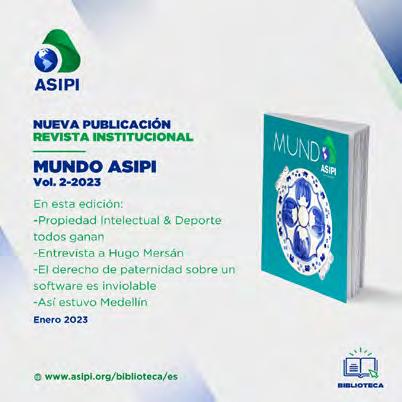
1 minute read
The European doctrine of clarified act has acceptance in the Andean Community
by MundoASIPI
The Andean Court of Justice has accepted the application of the doctrine of clarified act in the Andean Community. This concept establishes that when a legal act is ambiguous or unclear in its wording, it should be interpreted based on how it has been previously interpreted and applied by competent authorities or customary practice. This doctrine generates legal certainty, normative stability, and judicial efficiency.
Here are some excerpts from the ruling:
Source https://www.comunidadandina.org/DocOficialesFiles/ Procesos/391_IP_2022.pdf
Date March 13, 2023
Judge Hugo R. Gómez Apac
Origin Andean Court of Justice
Thesis 1 Prejudicial interpretation (PI) exists to guarantee the coherent and uniform application of community rules in the Member Countries of the Andean Community. Traditionally, it was mandatory to request PI in all cases, without exception, and the response only applied to the specific case under consultation. With this decision, the Andean Court of Justice (ACJ) modified its position and determined that, from now on, when the national judge of sole or first instance must resolve a dispute or apply the Andean Community legal system, they will not be obliged to submit a prejudicial consultation if the ACJ has already issued a pronouncement on the concerned norm.
Thesis 2 However, the obligation to submit the consultation remains when the ACJ has not issued a previous interpretation regarding the specific norm or when, despite a previous interpretation existing, the national judge has questions about specific hypothetical situations that arise from or relate to the Andean norm, or when they require the Court to specify, expand, or modify its criterion.
Thesis 3 The interpretation of the ACJ is based on the interpretative doctrine of clarified act developed by the Court of Justice of the European Union, according to which the prejudicial consultation lacks cause and content when the question raised is identical to one that has already been the subject of a prejudicial decision.
Thesis 4 Additionally, the ACJ took into account, in issuing its decision, the jurisprudence of the same Court, which allowed it to vary or even change its opinion on the mandatory submission of the preliminary consultation when justified reasons existed.
Subject Prejudicial interpretation.
Library
During the first semester of 2023 ASIPI, with the collaboration of its members, has made the following publications that can be found in our library: www.asipi.org/biblioteca/en













